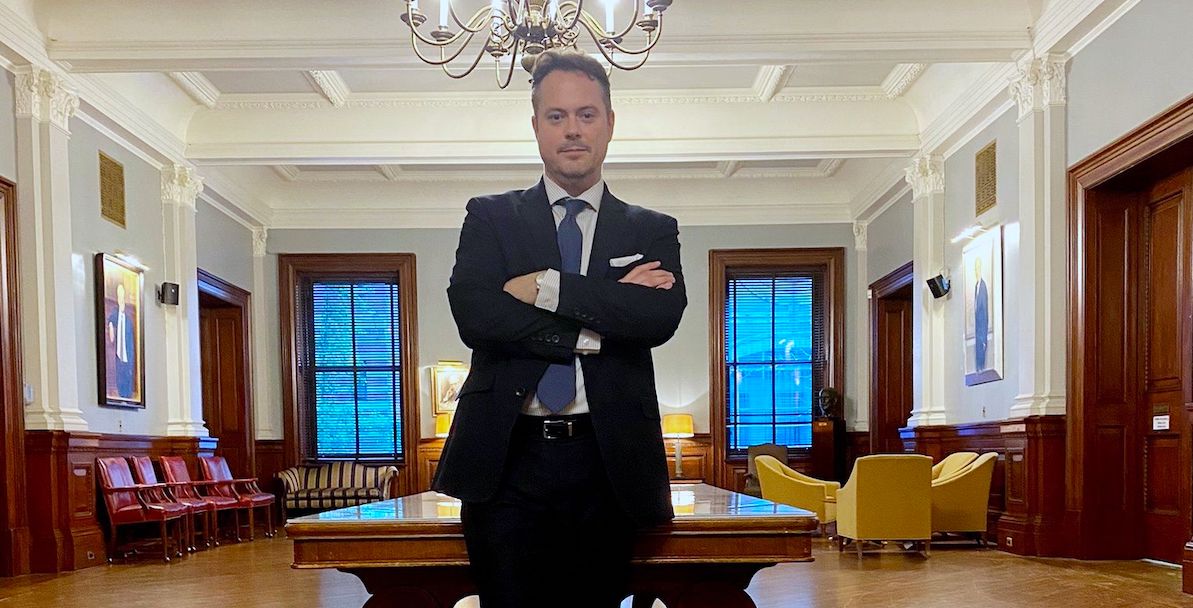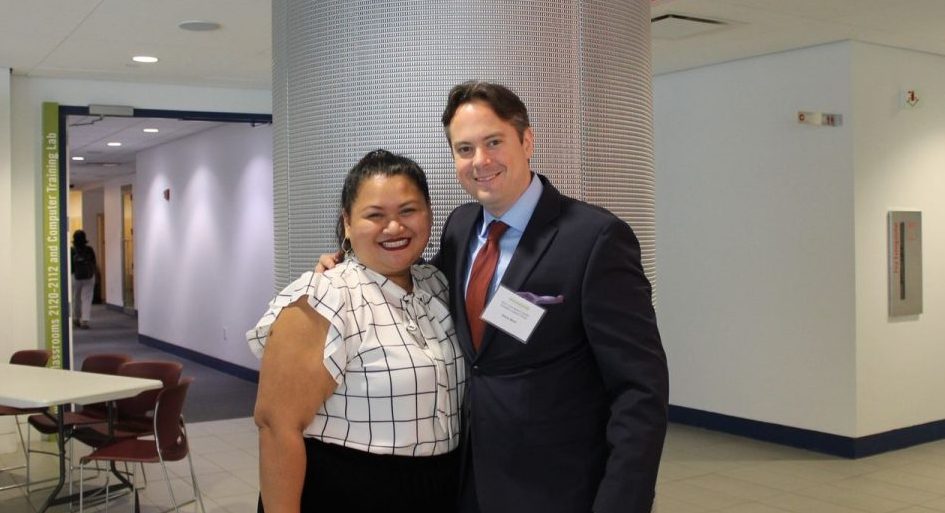He entered the evening program with over a decade of experience in law and business. Now, his leadership as a Partner at S. R. Labby LLP helps drive domestic and family matters and civil litigation, as well as pro bono work advocating for disability awareness and clients with aphasia.
 Entrepreneurship and experience
Entrepreneurship and experience
Jason Moor arrived knowing how to create and run a boutique law firm from the ground up. A new student in CUNY Law’s third Evening Program cohort, the opportunity for part-time was a perfect match for his ambitions: to build on more than a decade of paralegal experience and continue his executive leadership without slowing down. The fact that the Law School’s mission dovetailed with his own personal story and principles made it all seem “a bit fortuitous.”
Jason had tended to his dream of law school for nearly 15 years before matriculating. He set about his 20’s purposefully gaining experience as a paralegal, volunteering his time through AmeriCorps VISTA, and exploring books and art across New York City. When he originally planned to start law school in 2008, the job market and economy gave him pause and he chose to delay his dream. Unbeknownst to him, this setback created the opportunity to join S. R. Labby LLP.
“As a first-generation college grad from a low-income family and largely on my own, I took my friends’ advice about going to law school directly after ungrad especially to heart: was I ready to invest thousands of dollars and years of my life to a career I knew little about?” Jason goes on to share that “By joining S. R. Labby LLP as a senior paralegal and operations manager, I got the chance to work in new areas of law. I also learned to set aside my ego and embrace ownership and accountability to achieve better results, which has made me a better thinker and leader.”
Private practice for public interest
Jason knew that on the other side of law school, he wanted to continue his work at the firm, which he saw as a critical manifestation of CUNY Law’s mission. “Obviously not every attorney can choose to go into public interest work. However, private practice doesn’t eliminate the possibility of making a meaningful impact in the service of human needs.” No one knows this better than CUNY Law alumni. In fact, 1 in 4 of the Law School’s graduates start their own small firm or go into solo practice, which enables them to leverage their education and life experiences, select their areas of practice, and support their families and communities all while increasing the availability and affordability of legal representation. Jason sees pulling back the curtain on private practice operations and small- or solo-firm ownership as a meaningful way to increase the supply of affordable lawyers to help bridge access and equity gaps.
He is quick to recommend the benefits of working at a small law firm that go beyond personal mission fulfillment. “As attorneys who care about social justice, we need to pick our spots. For me, it’s working at an innovative law firm that encourages creative legal thinking and advocates for legal reform. I can work on cases of real significance, such as advocating for victims of sexual harassment and assault, and I have opportunities to get further involved in the issues that I’m passionate about, such as promoting rights for individuals with aphasia.”
Now, as a result of accruing nearly twenty years of unique and broad experience in the law as a paralegal and executive, he is a lawyer himself, and partner at S. R. Labby, where, with a focus on risk and crisis management, he provides “intelligent and discreet services to families and individuals involved in domestic and family matters, and civil litigation.” His background also includes aging and disability law. He also takes on pro bono work through the firm, including for clients with disabilities.
 Disability Justice from clinic to pro bono
Disability Justice from clinic to pro bono
While an evening student at CUNY Law, Jason worked in the Disability and Aging Justice Clinic, where he and another student represented an indigent client in a disability discrimination case before the New York City Commission on Human Rights. His education at CUNY Law expanded his perspective on the decades-long fight for disability rights. The movement, which began in the 1960s alongside the civil rights and women’s rights movements, didn’t see national legislation pass until the Rehabilitation Act of 1973 — and even then didn’t see a truly comprehensive civil rights bill prohibiting discrimination against people with disabilities until 1990. “Despite the amendment to the Americans with Disabilities Act in 2008, the Act remains arguably limited in scope as it still largely contemplates individuals with easily understood or recognizable disabilities (i.e., visible physical disabilities), and still leaves behind individuals with more ‘invisible’ disabilities, such as disabilities relating to mental impairment or, as I personally witnessed, aphasia,” Jason relays. “It’s critical the ADA catch up. As people live longer, there will be more people with invisible disabilities, like aphasia.”
If there’s one thing Jason would like fellow advocates and allies to know, it’s that while the court system is still struggling to enforce the rights of individuals with invisible disabilities — particularly those with aphasia — there are things you yourself can do to make a difference.
“For a person with aphasia, the battle begins when she physically enters the courtroom. Due to her communication disability, she may not be able to avail herself of the legal services of the court and fully participate in the court process. Unlike a person who uses a wheelchair, for instance, once in the courtroom, how can an individual with aphasia ask questions, receive instructions, file papers, appear on the record, and speak on her own behalf? She needs an accommodation to do these things.”
Aphasia
Aphasia is a common yet relatively unknown neurological condition that impairs a person’s ability to speak or understand others. Recent headlines, including actor Bruce Willis’s recent struggle with aphasia, and Lt. Gov. John Fetterman’s self-disclosure on the Pennsylvania campaign trail for a U.S. Senate seat, have brought the diagnosis into popular culture in recent months but have not been enough to promote widespread understanding of the condition.
Jason points out that aphasia is more common than Parkinson’s disease — currently 2 million people in the United States alone are affected by it — yet society knows and invests so much more when it comes to the latter. “Bruce Willis’s announcement and the resulting media is a good example,” he begins. “There are now abundant articles discussing aphasia, which is positive. However, these same articles celebrate Mr. Willis’s ability to ‘still’ play the harmonica and connect with his children. This showcases a serious misconception that aphasia affects a person’s intelligence when it does not. Of course he can still jam out and play with his kids! Sadly, it seems we (especially courts) equate language with intelligence. This is a mistake and has to change.”
Aphasia is too often mislabeled as a “cognitive” disability, which isn’t true. Here, Jason shares the words of a friend diagnosed with aphasia, who experienced this misunderstanding in court: “I am still me, smart, but words lost. Me not many words. I, your Honor, must stand up for myself and rights.”
“Just because a person with aphasia cannot provide narrative responses to questions does not mean she is legally incompetent or unable to testify. Suggesting a person with aphasia is legally incompetent may be a tempting and easy position for a court or opposing counsel to take. But while aphasia can take various forms, a person’s intelligence remains intact; her ability to speak or understand others is what has been impaired.” At this point, Jason becomes rueful. “Sadly, words and language are the indispensable tools of law. A person with aphasia has literally lost those tools.”
So, in the face of a dearth of understanding and ability to accommodate people with invisible disabilities, what can we do? It’s not legal advice, but here is what Jason shares as calls to action:
If you are an advocate or ally:
Use People First Language (PFL) as a way to emphasize the person, not the disability they live with. Make a point of leaving outdated language behind and avoid adjectives that limit or alienate. Here are some specific tips for aphasia communication.
Get connected and pull up. Attorneys and advocates alike can create or join a network of supporters alerted (perhaps through email or Twitter) of important upcoming events for individuals with a disability, such as court appearances, where supporters’ attendance can play a meaningful role.
If you’re an attorney:
Anticipate, expect, and prepare for misunderstanding from the minute you reach out to a court’s ADA liaison to the day you appear in court with your client.
Pack the courtroom. Many judges are elected; like a watchdog agency, the public (for whom judges work) should attend court hearings where individuals with a disability are a party to show judges that they care that their rights are respected.
Consider proactively protecting a person’s communication privilege. Without a third-party facilitator, communication carries a high risk of misunderstandings; with a third-party facilitator, potentially all communication with counsel could be disclosed if opposing counsel succeeds in making a claim that privilege has been waived. This may also have a chilling effect on the client’s comfort in communicating with you as counsel in the presence of a third-party facilitator. Anticipate, and protect.
Be prepared to insist that the court rule on a motion for reasonable accommodations under the ADA. …And then be prepared to lose the motion and appeal. Until courts are ready to properly accommodate individuals with aphasia, attorneys will need to appeal to higher courts of law to secure the rights of their clients.
For more from Jason, read his recent article “I Am Still Me: Aphasia and the Search for a Voice in the Legal Process,” co-authored with Malya Levin for the Senior Lawyer’s Division “Voice of Experience” Blog.
